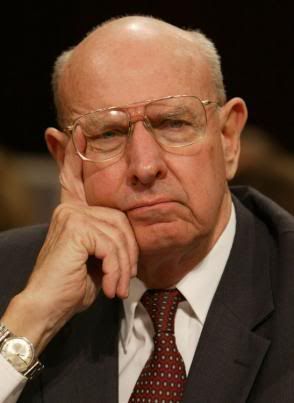Holder Refuses to Stand By Statements Saying Violating FISA Breaks the Law
By far the most disturbing part of the Senate Judiciary Committee oversight hearing today came when Russ Feingold asked Eric Holder whether he stands by a statement he made before the American Constitution Society last year.
In the midst of a speech that repeated "rule of law" like a Greek Chorus, after introducing this passage from his speech by saying certain steps taken by the Bush Administration "were unlawful," Holder said, "I never thought a President would act in direct defiance of federal law by authorizing warrantless NSA surveillance of American citizens."
When Feingold asked Holder whether he stands by that statement, Holder ignored the early part of his speech where he described all of Bush’s abuses to be "unlawful," and instead tried to claim he was narrowly saying that Bush simply "contravened" FISA.
FEINGOLD: On another topic, I wrote to the president on Monday about my continued concern that the administration has not formally withdrawn certain legal opinions, including the January 2006 white paper that provided the justification for the Bush administration’s warrantless wiretapping program. At the letter was prompted in part by a recent speech that I’m sure you’re aware of by the director of national intelligence in which he asserted that the program was not illegal, but he later clarified that.
In a speech to the American Constitutional Society in June 2008, you, sir, set the following. "I never thought that I would see the day when a president would act in direct defiance of federal law by authorizing warrantless NSA surveillance of American citizens."
And the president himself also several times as a senator and during the campaign said the program was illegal. Now that you are the attorney general, is there any doubt in your mind that the warrantless wiretapping program was illegal?
HOLDER: Well, I think that the warrantless wiretapping program as it existed at that point was certainly unwise in that it was put together without the approval of Congress and as a result did not have all the protections, all the strength that it might have had behind it, as — as I think it now exists with regard to having had congressional approval of it. So I think that the concerns that I expressed in that speech no longer exist because of the action that Congress has taken in regard…
FEINGOLD: But I asked you, Mr. Attorney General, not whether it was unwise, but whether you consider it to be an illegal, because that’s certainly the implication of what you said in the quote I read and the explicit statement of the man who is now president of the United States.


 Thomas Pickering is a career diplomat who served as U.S. ambassador to Jordan (1974–1978), Nigeria (1981–1983), El Salvador (1983–1985), Israel (1985–1988), the United Nations (1989-1992), India (1992–1993) and Russia (1993–1996). He is now vice chairman of
Thomas Pickering is a career diplomat who served as U.S. ambassador to Jordan (1974–1978), Nigeria (1981–1983), El Salvador (1983–1985), Israel (1985–1988), the United Nations (1989-1992), India (1992–1993) and Russia (1993–1996). He is now vice chairman of  Vice Admiral Lee Gunn (Ret.), who served in the final three years of his 35-year military career as Inspector General of the Department of the Navy, is now president of the Institute of Public Research at the
Vice Admiral Lee Gunn (Ret.), who served in the final three years of his 35-year military career as Inspector General of the Department of the Navy, is now president of the Institute of Public Research at the  John J. Farmer Jr., the former attorney general of New Jersey was Senior Counsel to the 9/11 Commission. He is a
John J. Farmer Jr., the former attorney general of New Jersey was Senior Counsel to the 9/11 Commission. He is a  Frederick A. O. Schwarz, Jr. Chief Counsel at the
Frederick A. O. Schwarz, Jr. Chief Counsel at the  David B. Rivkin, Jr. is a
David B. Rivkin, Jr. is a  Jeremy Rabkin, a renowned scholar of internationalaw, is a professor at George Mason University School of Law in Arlington, Va. A member of the board of directors of the
Jeremy Rabkin, a renowned scholar of internationalaw, is a professor at George Mason University School of Law in Arlington, Va. A member of the board of directors of the